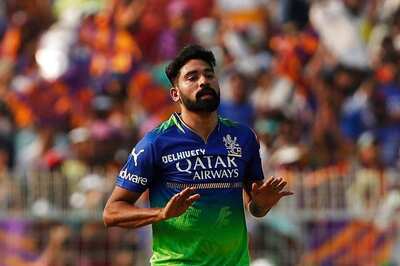
views
Passionate little Brazilian boys cried their last during the semi-final of the 2014 Football World Cup, while little Baichungs in India witnessed the dawn of a brand new footballing era in their nation.
For a 10-year-old, his emotions are threatened by the virtue of his birth, by the wavering national flag. Such was the story of the beautiful game in the year 2014; football was bitter-sweet after taste for fans across the world.
With the football World Cup in Brazil and the Indian Super League, there was no shortage of memorable moments in 2014.
Germany is known for its beer festival, Caribbean islands for music and India for cricket. But when you talk about football which is probably the only global sport in the world, no other country extracts so much passion and emotion like Brazil as the Latin American takes to football like a duck takes to water.
A World Cup without a Brazilian side is like having sweets without sugar and their ouster in the semi-finals of the Football World Cup 2014 was heart-breaking to the say the least, not because they lost but in the manner in which they lost. It is like stripping somebody naked in the middle of million people and every inch of cloth is not enough to hide the humiliation and agony.
A football carnival soon turned into a mourning drama as people from all parts of the world lost some clothing in the hands of the Germany.

But for Brazil, the World Cup was a success. Hosted with fervor and with little trouble off the field, the tournament provided several big moments, from Luis Suarez's bite to Spain's unexpected early exit.
For millions of fans, the problems off the field were not apparent on the pitch when the World Cup kicked off in June. The civil unrest that marred the Confederations Cup, the 2013 dress rehearsal tournament, was not repeated and Brazil's progress to the semis played a big role in keeping rebels off the streets.
Brazil beat Croatia 3-1 in a breathtaking opener that set the tone for the rest of the tournament in which invisible spray and goal line technology made their debut.
It was an opportunity for coach Luiz Felipe Scolari and his Samba boys to obliterate the throbbing memory of losing out at home to Uruguay in the last World Cup they hosted in 1950 but a traumatic defeat ended that dream as Germany, already 1-0 up, scored four goals in six minutes to lead Brazil 5-0 after 29 minutes before winning the all-important match 7-1.
Fans across the country reacted in dismay and grief, while the players themselves could barely believe the magnitude of the defeat. The wounds of 1950 were still left unhealed and the worst defeat in its 100-year football history at the Mineirao Stadium only added insult to the injury for a football-crazy nation of 200 million whose identity is associated by its team.
The country's media called it a national humiliation, biggest disgrace in the team's history and a historic shame.
And five days after the catastrophe, Germany beat Argentina 1-0 in the final at the Maracana with substitute Mario Goetze scoring a brilliant extra-time winner.
Such is sports! As the destruction of a generation could only lead to the creation of another as Brazil look to rebuild and live to fight another day.
If Brazil's historic defeat shook the whole footballing community, another country was preparing itself to embrace a new league to revive the lost sport.
Nearly 15,000 kilometers away from Brazil and in a nation largely ruled by cricket, the game of football got a new ray of hope in its battle of survival. The emergence and the eventual success of the Indian Super League took the country by storm. For the generation which is used to watch late night European football matches, the ISL brought an unprecedented change in the culture.
For the first time in decades, the game which was once hugely popular but now confined to a few pockets of the country, managed to attract media attention and gather overwhelming fan following across the nation.
In a country that lacks a proper football culture, to be boasting of a league fourth most attended in the world surpassing Italian Serie A and French Ligue 1 is an achievement by itself, not to mention its popularity in Asia that garners quite a lot of attention for not being a particularly great footballing region.
The ISL has turned the tables in Asia, with the average match attendance for the tournament at 24,357 - the highest across Asia, trailing only to Germany's Bundesliga, the English Premier League and Spain's La Liga.
The ISL website had over 16 million online video views throughout the tournament, spread over two months. The league's official online channel registered an astonishing 28.7 million visits.
It also managed to turn the heads on social media, registering 1.8 million conversations, 10 billion impressions and 275,000-plus unique authors - staggering numbers that speaks volume of its success.
The presence of big names like Zico, Nicolas Anelka, Alessandro Del Piero, David James, Robert Pires, Freddie Ljunberg, Elano, David James and Luis Garcia, among others, mesmerized the fans and left them hungry for more. The presence of cricketing icons like Sachin Tendulkar, Sourav Ganguly and Bollywood celebrities like Abhishek Bachchan, Ranbir Kapoor, Hrithik Roshan and John Abraham was an icing on the cake.
From the opening match in Kolkata's Salt lake Stadium, attended by 65,000-odd supporters to the winning goal headed by Atletico de Kolkata's Indian midfielder Mohammed Rafique against Kerala Blasters FC in the injury time in Navi Mumbai's DY Patil Stadium, the tournament gave a plethora of reasons for the fans to smile. It was a befitting finish to the league which promises to develop the game in the country.
The ISL has kicked-off football in India and it can only grow leaps and bounds from here and one can only hope that its success rubs on to the Indian national football team - currently languishing at 171st place in the FIFA rankings.
Only time will tell. Till then we can wait eagerly for the second season of the ISL.


















Comments
0 comment